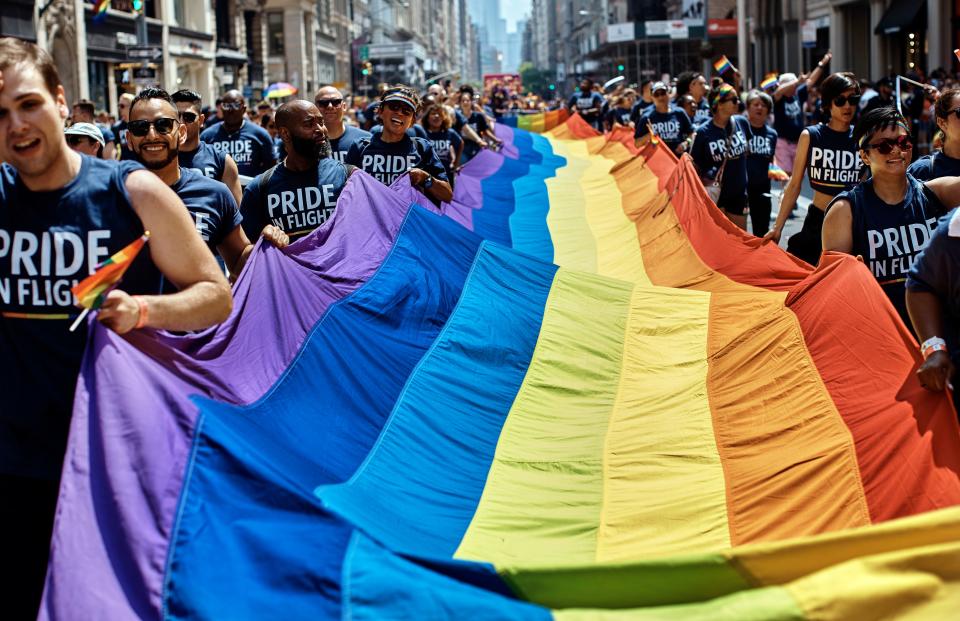Ending LGBTQ+ discrimination is a path to unity. Delaware must take it | Opinion
- Oops!Something went wrong.Please try again later.
- Oops!Something went wrong.Please try again later.
As a faith leader here in Delaware, I am grateful for the commitment shown by Sen. Tom Carper and Sen. Chris Coons to ensure fairness and equality for all Americans. For decades, Washington has neglected its responsibility to protect LGBTQ+ Americans — but with both parties now offering proposals to add nondiscrimination protections to the law, we can finally get the job done. I look to Senators Carper and Coons to take the lead in making sure this crucial legislation gets enacted.
My current call within the Presbyterian Church USA is with the New Castle Presbytery, where I serve as chief ecclesiastical officer with oversight of how we govern ourselves and primary responsibility in supporting our ordination process.
Celebrating the embrace of LGBTQ+ people
Over more than a decade of service in several presbyteries, at our denomination’s National Assembly, and at two congregations, I’ve witnessed and celebrated the PCUSA’s evolving embrace of LGBTQ+ people — first in allowing the ordination of ministers from the community and later in giving congregations the freedom to marry same-gender couples.
At a Massachusetts congregation that I served while the PCUSA was still debating ordination of LGBTQ+ ministers, I participated in the election of a gay Elder who had been enlisted in the U.S. Navy but was then discharged under the former Don’t Ask, Don’t Tell policy. Presbyterians are not typically thought of as a boisterous bunch, but when the man’s name was read aloud, the congregation shouted out an enthusiastic “yes.”
In my service as a Presbytery official, I witnessed another congregation rally to support the church organist as she underwent her gender transition.
Sadly, I’ve also seen a congregation close because of its fractious rejection of LGBTQ+ inclusion. A gay member who left the congregation amidst the controversy later died by suicide, and leaders too late came to recognize that their lack of welcome contributed to the tragedy.

It takes work
I appreciate the work it takes for communities and individuals to come to an understanding of LGBTQ+ lives because I’ve undergone my own journey in appreciating what my faith teaches me. Raised in a conservative evangelical faith tradition, it was during college and seminary that I first met LGBTQ+ peers and saw how respected they were. I knew what I’d learned as a youth, and now in a different religious setting I experienced something new. Wrestling with that in prayerful discernment, I concluded that the command to love God and to love my neighbor needed to be my priority.
Excluding LGBTQ+ people from a faith community does deep damage to their lives, both physically and spiritually. How to choose welcome, how to be a community that walks alongside our LGBTQ+ neighbors is critical to our work in bringing unity in our congregations and in our communities.
As a nation, we have a long way to go in achieving that unity. I’ve learned that one in three LGBTQ+ Americans, according to a 2020 survey, experienced discrimination — in public spaces, on the job, in schools, and in their own neighborhoods — in just the previous year.
That number rises to 60% among transgender people, who endure exceptionally high levels of unemployment and homelessness. They are also stalked by violence, with a record 44 hate-motivated murders nationwide last year.
Black and Latino LGBTQ+ people face greater poverty rates than communities of color generally. Less than half the states protect the community’s youth from bullying in school. Elders must often re-closet themselves, with nearly half of same-gender couples reporting discrimination in seeking senior housing.
Light at the end of the tunnel
Thankfully, there is now hope Congress might finally act. For the first time, both Democrats and Republicans have put forward measures adding LGBTQ+ protections to our nation’s civil rights laws. The major disagreement between the two parties involves balancing the urgent need to protect LGBTQ+ people with the religious freedom we cherish as Americans.
Finding a path to getting that job done is what legislators do when committed to solving problems. Carper and Coons surely appreciate that Delaware and 20 other states have successfully enacted laws that prohibit anti-LGBTQ+ discrimination without compromising religious freedoms.
Washington can follow suit, with senators reaching across the aisle to end the divisive pattern pitting religious liberties against the rights of LGBTQ+ Americans. Every major civil rights advance — from the 1964 Civil Rights Act to the Americans With Disabilities Act — has found the appropriate balance.
Senators Carper and Coons, Tens of thousands of LGBTQ Delawareans and their families and friends count on your continued leadership.
The Rev. Cindy Kohlmann is the chief ecclesiastical officer and Stated Clerk of the New Castle Presbytery. Kohlmann can be reached at ckohlmann@ncpresbytery.org
This article originally appeared on Delaware News Journal: Ending LGBTQ+ discrimination is a path to unity. Delaware must take it

